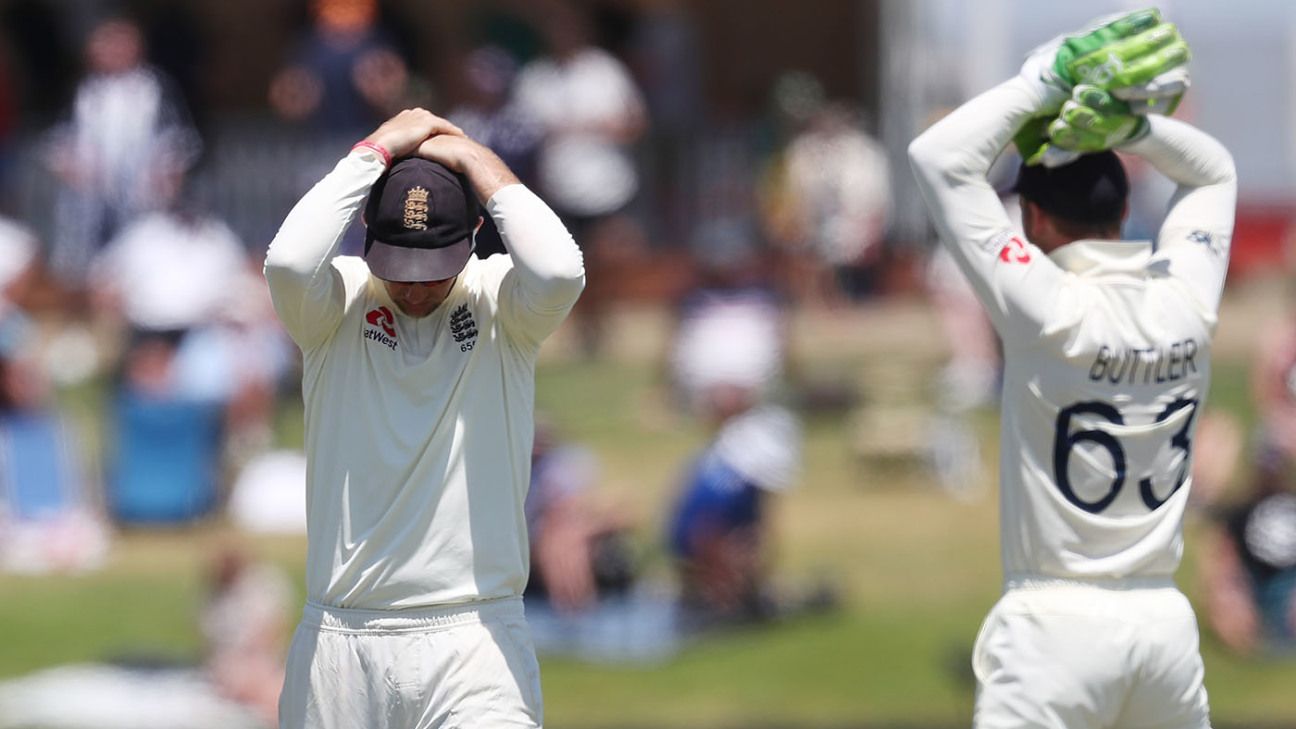
Jos Buttler believes England must learn from New Zealand's approach in the first Test in Mount Manganui.
While England were kept in the field for more than 200 overs as New Zealand amassed more than 600 runs, Buttler felt it was England's batsmen who had most to learn from New Zealand's disciplined approach to the game. England were dismissed for 353 in their first innings; a score that looks ever more below par the longer the match progresses.
"If we're really critical, it's the first-innings runs with the bat [which have cost us]," Buttler said. "New Zealand played a very patient game with the bat. They showed the value of that patient game of batting on flat wickets and setting your sights very high. BJ Watling and Mitchell Santner really set their stall out and batted for a long time. They put a lot of overs into our legs and built that score.
"We have to learn to be able to do that. You look at the top sides around the world on flat wickets and they get very, very big scores and bat for a very, very long time.
"That's a big learning point for us. With the bat, just when you think you're getting to a place where you need to be, there's a lot more hard work to come to build those big scores.
"You can't fault the bowlers' efforts. I thought the effort of everyone was outstanding."
While Buttler accepted England had struggled to adapt from the "fast-forward cricket" played in England in recent times, he rejected the suggestion the Kookaburra ball should be adopted in Championship cricket. Instead he insisted the Dukes ball, which generally provides bowlers with more assistance, created more entertaining cricket but suggested the pitches in county cricket should be improved.
"Test cricket with a Dukes ball in England is fantastic," he said. "It's very watchable. It's a good contest between bat and ball. I think most people talk about introducing a Dukes to the rest of the world as opposed to the other way around.
"The product we have with Test cricket in England is up there with the best product in the world so I wouldn't want to tamper with that very much.
"One thing potentially we can do in England is play on better batting wickets. The Dukes ball still offers the bowlers enough, especially in England if you get the overhead conditions. But we could look at playing county cricket on better batting wickets.
"But we have played a lot of Test cricket in different conditions over the past year where it's been fast-forward cricket. We have to be adaptable. There's some education for all of us as batters."
What had looked a docile pitch when New Zealand batted suddenly looked full of danger when England began their second innings. But Butter suggested that was a reflection of the match situation and the pressure England were under as much as it was anything to do with the pitch. And, he said, it was another area England had to learn from New Zealand.
"We have to learn about scoreboard pressure as well," he said. "If you have got those runs on the board, if you have put miles into the legs of batsmen who have to field for 200 overs, it puts those guys under a lot of pressure when they come out to bat 10 minutes later.
"Scoreboard pressure is massive. If we had made 450-500-plus in the first innings, it would have been a completely different outlook for the team batting second."
Buttler also defended Jofra Archer from any criticism, providing a reminder that he is only five Tests into his career.
"I think you all forget Jofra is very new to international cricket," he said. "It's his first overseas tour and the first time he's bowled with a Kookaburra ball. He is a very special talent but he is only five games into his Test career. You can't ask too much of him too soon.
"He's a very special talent and we've got to look after him. He's a fantastic guy and has a great attitude as well. He'll learn from this and he's a great attribute to us."















 Phone: (800) 737. 6040
Phone: (800) 737. 6040 Fax: (800) 825 5558
Fax: (800) 825 5558 Website:
Website:  Email:
Email: 






